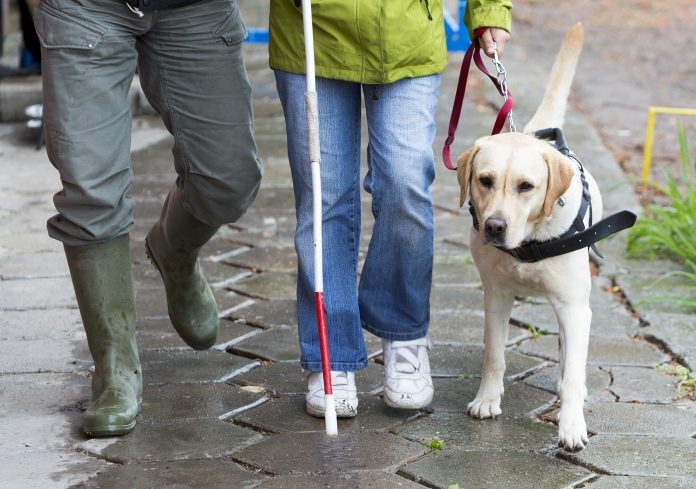A poll commissioned by eye research charity Fight for Sight has found that 4 in 10 Brits either has or knows someone with significant sight loss, and a third of these people have experienced mental health issues
The online poll conducted by YouGov on behalf of Fight for Sight, also shows that 84% of Brits fear losing their sight more than any other sense, with 40% saying that not being fully independent would worry them the most about this. According to Fight for Sight, there are currently 2 million people living with sight loss in the UK, and by 2050 this is set to double to 4 million.
The poll coincides with the launch of a ‘Global Challenge Fund’ – a fund set up by Fight for Sight in partnership with interdealer broker ICAP – to tackle the UK’s leading cause of blindness: age-related macular degeneration (AMD).
Sight loss has the potential to cost people their livelihoods, well before their retirement. Premature loss of livelihood, as well as feelings of isolation and loneliness, may go some way in accounting for findings that more than four in 10 people attending low vision clinics are suffering from symptoms of clinical depression.[1]
The story of Nicolette Collins (64) from Eastbourne
Nicolette has age-related macular degeneration and consequently is now unable to continue her work as a teacher. She has had to self-fund her Avastin injections – which are used to treat age-related macular degeneration to slow vision loss – since Lucentis injections (a more expensive version of these) are rationed on the NHS. This – along with Nicolette’s feelings of isolation as a result of her sight loss, has contributed to her feelings of low mood.
“Living with sight loss has had a huge impact on my life. Having low vision and limited independence has led me to feel cut off and isolated from people and I often have feelings of low mood. I was a teacher, but my failing sight means I can no longer work and I do not qualify for my pension.
“Losing my sight has made me unable to do the things I love, such as reading, learning Italian, painting, and socialising. It has also impacted my husband’s life as I have become more dependent on him. It’s likely that he will have to become my carer.
“I really want to help raise awareness of the impact of sight loss and the prevalence of age-related macular degeneration. There needs to be more research into better treatments for this devastating eye condition.
“I strongly feel that people should not have to pay for Avastin injections just because Lucentis injections are rationed on the NHS. I have paid for five injections so far this year.”
The aim of the ICAP Global Challenge Fund is to discover potential new treatments for this devastating eye disease, bringing hope to millions of people worldwide who are affected by it.
The charity has a goal of a new treatment for macular degeneration in the next decade and currently funds 22 research projects into the condition. More information on these projects can be found here: https://www.fightforsight.org.uk/our-research/macular-degeneration/
Age-related macular degeneration is the most common cause of irreversible sight loss, affecting approximately 728,000 people in the UK. This is likely to increase by nearly 30% in the next ten years, meaning over 930,000 more people face the prospect of retiring with sight loss in 2030.[2]
Dr Neil Ebenezer, Director of Research at Fight for Sight, said:
“This research is sadly unsurprising. Often sight loss and mental health issues go hand in hand. That’s why Fight for Sight is keen to raise awareness of the personal impact of sight loss and the need for more research into conditions like age-related macular degeneration, which can often severely affect people’s quality of life.
“Due to an ageing population, the number of people living with sight loss is set to rise significantly. In order to develop new treatments, we need more research.
“We are excited that the ICAP Global Challenge Fund could accelerate the discovery of a new treatment for AMD. Its successes will support future teams and scientific leaders to address the challenges of age-related macular degeneration, with the hope of ultimately developing a more effective treatment.”
About age-related macular degeneration (AMD)
Age-related macular degeneration is an extremely common cause of severe sight loss in adults and can develop very rapidly, sometimes in both eyes. The disease causes loss of central vision which often has a huge impact on daily life.
Currently, sight lost to age-related macular degeneration cannot be reversed. Sadly, the only treatment for some age-related macular patients are painful, routine injections directly into the eye which are not always effective at slowing progression of the disease.
Given the prevalence and growing scale of the disease, there is hope that the ICAP Global Challenge Fund will lead the fight against age-related macular degeneration and bring hope of a new treatment.
Where to go if you are affected by any of these issues
Losing your sight or realising your sight is deteriorating, can be difficult to cope with, as it can affect so many different aspects of your life. To access more information on the different types of emotional support groups and counselling services, please visit the Sight Advice FAQ website: https://www.sightadvicefaq.org.uk/emotional-support/counselling-support
References:
[1] Nollett C, Bray N, Bunce C, et al (2016) Depression in visual impairment trial (DEPVIT): a randomized clinical trial of depression treatments in people with low vision. Invest Ophthalmol Vis Sci. 57:4247–4254.
[2] The Royal College of Ophthalmologists: The Way Forward: Options to help meet demand for the current and future care of patients with eye disease.Figure B8: Way Forward projections for UK case numbers 2010-2035. P31











